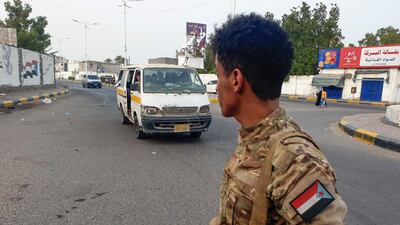A leading official of war-torn Yemen’s southern political movement has said the fragile truce between Houthi rebels and the internationally recognised government must be extended to avoid the world’s worst humanitarian crisis from deteriorating.
On an official visit to London this week, Amr Al Bidh of the Southern Transitional Council said rising energy and food prices brought about by the war in Ukraine were exacerbating an already dire situation on the ground.
“The truce really helped everyone,” he told a briefing on Thursday. “Everyone needs the truce, everyone is exhausted by this war and everyone wants to focus on helping the people helping the economy.”
The STC’s foreign affairs representative also voiced his concern over the rising price “of fuel inside our already collapsing economy”, in a country that is teetering on the brink of famine.
Yemen’s former deputy foreign minister Mustapha Al Noman this month told The National he thought the ceasefire would likely be extended to create more time to negotiate a longer-term solution.
The initial two-month truce, the first in Yemen since the war broke out in 2014, began on April 2 and was extended for a further two months in May. It is set to expire on August 2 and US special envoy for Yemen Tim Lenderking is in the Middle East visiting Saudi Arabia and Jordan to continue diplomatic efforts to support the UN-mediated truce in Yemen.
The trip comes after US President Joe Biden's visit to Israel and Saudi Arabia, where the situation in Yemen featured prominently in discussions.
While a cessation in military operations from both sides has held up and commercial flights from the capital Sanaa have resumed — along with shipments of fuel vessels into the port of Hodeidah — not all provisions of the truce have been fully realised.
Roads leading to the largely government-held and besieged city of Taez remain closed.
Mr Al Bidh said: “We need to find solutions but the most important thing is that we don’t lose the truce.
“It's not just about the roads in Taez, there are roads on six fronts that need to be opened and we did that unilaterally. But at the same time, we can't just focus on one issue.
“We want to focus on other things, on the people, on how to build institutions and organisations that can make reforms in the financial sector.”
'Different agendas'
Inclusion in an overall peace process, should it come, is another concern for the STC.
A new eight-member governing council in Yemen was formed after talks hosted by the Gulf Co-operation Council (GCC) in Riyadh in April.
The new Presidential Leadership Council (PLC) includes the president of the STC, Maj Gen Aidarous Al Zubaydi, but there are concerns within the southern-based faction over whether their interests will feature in future negotiations.
“The problem with the PLC is that eight people with different agendas is very complicated, it's not that easy,” said Mr Al-Bidh. “We don't have a good history in managing crises in Yemen, especially in the south.
“There should be a joint delegation between the STC and the government to manage the peace process and we want that.”
He said the majority of decisions affecting Yemen had been made without consulting the STC, although his group acknowledged that most of the outcomes were positive. “It’s a good thing for the people, we accept that,” he said. “But we don't accept the way it's done.”
Mr Al Bidh said he met a delegation of international NGOs in London on Wednesday to discuss ways to obtain additional humanitarian aid for the beleaguered. About 400,000 people have been killed in Yemen during the seven-year war, with millions uprooted from their homes and impoverished. The United Nations estimates that more than 23 million people in Yemen will require some form of assistance or protection this year alone.
Mr Al Bidh said critical funding gaps, global inflation and the knock-on effects of the war in Ukraine had made an already desperate situation worse.
“When this happens, then politically everyone is pointing at each other and saying ‘you're the one to blame’ and this destroys the cohesiveness of the PLC because people are under pressure,” he said.
“People are suffering, even from within our military, they are on the streets, asking about their salaries. People can’t provide fuel or infrastructure, and it’s disastrous.
“So it's getting worse and worse and that doesn't look good if we want to have a stable situation during this truce because people are waiting for something.”
Mr Al Bidh said his visit to the UK capital, during which he will consult with the Foreign Office, is part of the STC’s bid to continue engaging internationally and “in parallel” with the PLC.


